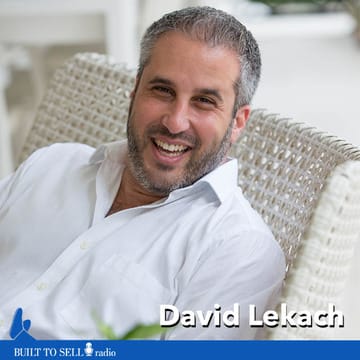About this episode
David Lekach started Dream Water; a natural sleep aid bottled in a 5 oz shot similar to the famous 5-Hour Energy Drink.
Lekach built Dream Water up to almost $10 million in annual revenue before selling it to Harvest One, a cannabis company, for $34.5 million in cash and Harvest One stock.
One of the biggest takeaways for aspiring value builders is staying focused on what you’re good at and outsourcing the rest. In Dream Water’s case, Lekach saw his role as “selling Dream Water, not making it.” That meant he outsourced the manufacturing, packaging, and distribution of Dream Water to a co-packer while Lekach and his team focused on selling it. They launched Dream Water in New York, with a catchy public relations hook of helping “the city that never sleeps get some rest.” Instead of focusing on gas stations where 5-Hour Energy had a stronghold, Lekach reasoned that sleep aids are sold at a pharmacy, so they partnered with giant retailer Duane Reade for their launch in Manhattan.
There’s lots more to learn from Lekach including:
- How to calculate Internal Rate of Return (IRR).
- The most significant mistake founders make when raising money.
- How to make sure an acquirer follows through on an LOI.
- The dirty little secret of selling to the likes of Walgreens and Wal-Mart.
Warning: this episode includes some coarse language.
Lekach experienced a devastating blow when Wal-Mart changed the way they were displaying Dream Water, leading to a 30% drop in Dream Water’s total sales. It was a near-death experience for Lekach and prompted him to want to sell as soon as he was able to steady sales. One of the unexpected by-products of the coronavirus pandemic is a growing army of founders who have decided to sell as soon as they can stabilize their business. If you find yourself feeling like you want to get out, consider getting your PREScore™ by answering 12 simple questions. It’s free and will have you thinking differently about the road ahead.
Check out our article on 10 Things Warren Buffett Wants You To Know Before Signing An LOI.
And Lessons From The Happiest Founders too.

About Our Guest
Prior to the sale of his company in May of 2018, David Lekach was the Chief Executive Officer of Dream Products LLC. As the architect of the company’s growth strategy, David was responsible for managing all aspects of the business, including, sales, marketing, manufacturing and finance. Dream Products manufactures and markets Dream Water, a natural, zero calorie, 2.5oz liquid sleep enhancer, that is also available in a powder format that you can take with or without water.
Before launching Dream Products, David worked briefly as an investment banker and prior to that, David served as the managing partner in a small Miami-based law firm, handling a variety of legal and business development focused consulting projects. Those projects included the structuring and general oversight of international real estate ventures worth more than $50 million and numerous consumer goods opportunities, ranging from licensing to product development engagements.


